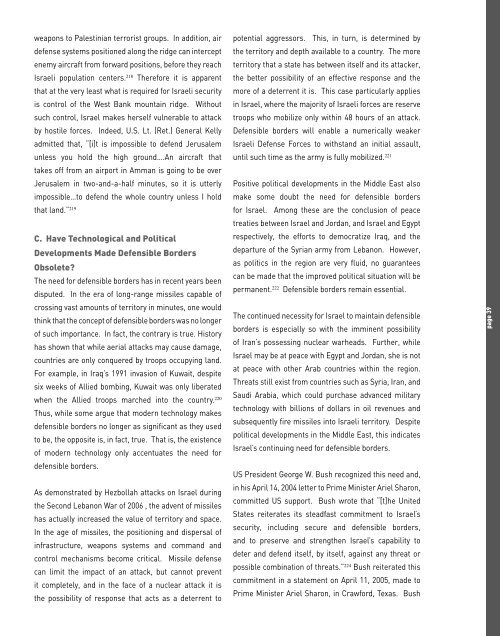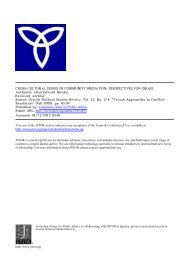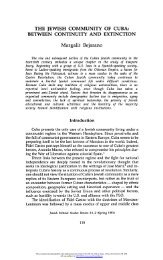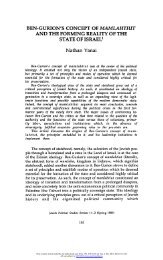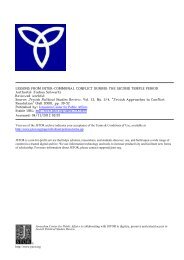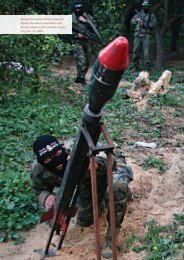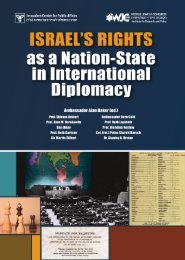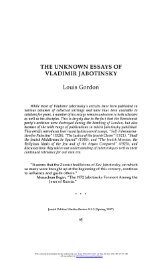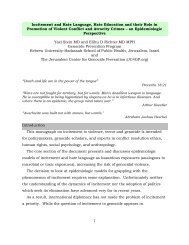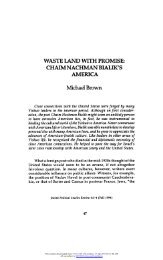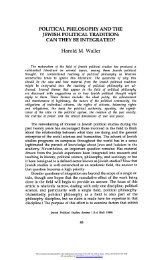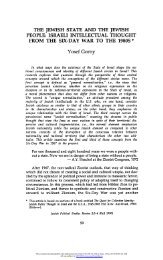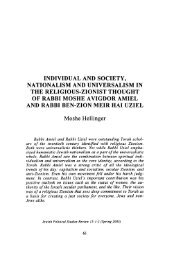Linking the Gaza Strip with the West Bank: - Jerusalem Center For ...
Linking the Gaza Strip with the West Bank: - Jerusalem Center For ...
Linking the Gaza Strip with the West Bank: - Jerusalem Center For ...
You also want an ePaper? Increase the reach of your titles
YUMPU automatically turns print PDFs into web optimized ePapers that Google loves.
weapons to Palestinian terrorist groups. In addition, airdefense systems positioned along <strong>the</strong> ridge can interceptenemy aircraft from forward positions, before <strong>the</strong>y reachIsraeli population centers. 218 Therefore it is apparentthat at <strong>the</strong> very least what is required for Israeli securityis control of <strong>the</strong> <strong>West</strong> <strong>Bank</strong> mountain ridge. Withoutsuch control, Israel makes herself vulnerable to attackby hostile forces. Indeed, U.S. Lt. (Ret.) General Kellyadmitted that, “[i]t is impossible to defend <strong>Jerusalem</strong>unless you hold <strong>the</strong> high ground….An aircraft thattakes off from an airport in Amman is going to be over<strong>Jerusalem</strong> in two-and-a-half minutes, so it is utterlyimpossible…to defend <strong>the</strong> whole country unless I holdthat land.” 219C. Have Technological and PoliticalDevelopments Made Defensible BordersObsolete?The need for defensible borders has in recent years beendisputed. In <strong>the</strong> era of long-range missiles capable ofcrossing vast amounts of territory in minutes, one wouldthink that <strong>the</strong> concept of defensible borders was no longerof such importance. In fact, <strong>the</strong> contrary is true. Historyhas shown that while aerial attacks may cause damage,countries are only conquered by troops occupying land.<strong>For</strong> example, in Iraq’s 1991 invasion of Kuwait, despitesix weeks of Allied bombing, Kuwait was only liberatedwhen <strong>the</strong> Allied troops marched into <strong>the</strong> country. 220Thus, while some argue that modern technology makesdefensible borders no longer as significant as <strong>the</strong>y usedto be, <strong>the</strong> opposite is, in fact, true. That is, <strong>the</strong> existenceof modern technology only accentuates <strong>the</strong> need fordefensible borders.As demonstrated by Hezbollah attacks on Israel during<strong>the</strong> Second Lebanon War of 2006 , <strong>the</strong> advent of missileshas actually increased <strong>the</strong> value of territory and space.In <strong>the</strong> age of missiles, <strong>the</strong> positioning and dispersal ofinfrastructure, weapons systems and command andcontrol mechanisms become critical. Missile defensecan limit <strong>the</strong> impact of an attack, but cannot preventit completely, and in <strong>the</strong> face of a nuclear attack it is<strong>the</strong> possibility of response that acts as a deterrent topotential aggressors. This, in turn, is determined by<strong>the</strong> territory and depth available to a country. The moreterritory that a state has between itself and its attacker,<strong>the</strong> better possibility of an effective response and <strong>the</strong>more of a deterrent it is. This case particularly appliesin Israel, where <strong>the</strong> majority of Israeli forces are reservetroops who mobilize only <strong>with</strong>in 48 hours of an attack.Defensible borders will enable a numerically weakerIsraeli Defense <strong>For</strong>ces to <strong>with</strong>stand an initial assault,until such time as <strong>the</strong> army is fully mobilized. 221Positive political developments in <strong>the</strong> Middle East alsomake some doubt <strong>the</strong> need for defensible bordersfor Israel. Among <strong>the</strong>se are <strong>the</strong> conclusion of peacetreaties between Israel and Jordan, and Israel and Egyptrespectively, <strong>the</strong> efforts to democratize Iraq, and <strong>the</strong>departure of <strong>the</strong> Syrian army from Lebanon. However,as politics in <strong>the</strong> region are very fluid, no guaranteescan be made that <strong>the</strong> improved political situation will bepermanent. 222 Defensible borders remain essential.The continued necessity for Israel to maintain defensibleborders is especially so <strong>with</strong> <strong>the</strong> imminent possibilityof Iran’s possessing nuclear warheads. Fur<strong>the</strong>r, whileIsrael may be at peace <strong>with</strong> Egypt and Jordan, she is notat peace <strong>with</strong> o<strong>the</strong>r Arab countries <strong>with</strong>in <strong>the</strong> region.Threats still exist from countries such as Syria, Iran, andSaudi Arabia, which could purchase advanced militarytechnology <strong>with</strong> billions of dollars in oil revenues andsubsequently fire missiles into Israeli territory. Despitepolitical developments in <strong>the</strong> Middle East, this indicatesIsrael’s continuing need for defensible borders.US President George W. Bush recognized this need and,in his April 14, 2004 letter to Prime Minister Ariel Sharon,committed US support. Bush wrote that “[t]he UnitedStates reiterates its steadfast commitment to Israel’ssecurity, including secure and defensible borders,and to preserve and streng<strong>the</strong>n Israel’s capability todeter and defend itself, by itself, against any threat orpossible combination of threats.” 224 Bush reiterated thiscommitment in a statement on April 11, 2005, made toPrime Minister Ariel Sharon, in Crawford, Texas. Bushpage 39


